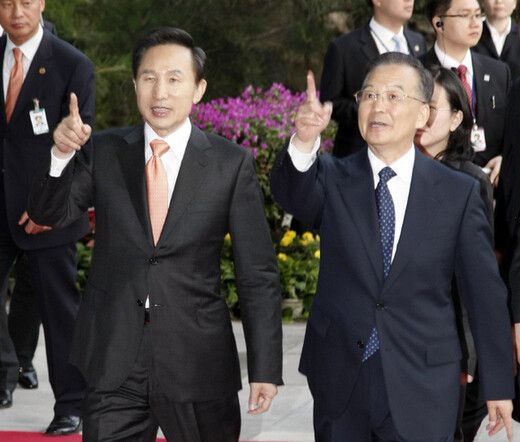hankyoreh
Links to other country sites 다른 나라 사이트 링크
China’s foreign ministry stirs up trouble

There is a growing controversy after China’s foreign ministry likened the South Korean government’s push to strengthen its alliance with the United States to a “military alliance reminiscent of the Cold War.” The comment came hours before President Lee was scheduled to meet with Chinese President Hu Jintao during his visit to China this week, so some analysts say it could cause a diplomatic feud between the two nations. Some also said the remark was a diplomatic provocation.
In a regular press briefing on May 27, China’s foreign ministry spokesperson Qin Gang said, “The U.S.-ROK military alliance is something leftover from history. As we all know, times have changed, and so have situations in all of the countries in this region. The Cold War framework of a ‘military alliance’ would not be valid in viewing, measuring and handling the current global or regional security issues.” ROK refers South Korea’s official name, the Republic of Korea.
Qin’s remark was made after the spokesperson was asked by a journalist about what kind of impact South Korea-U.S. relations would have on security in Northeast Asia.
The remark was seen as akin to denouncing the South Korea-U.S. alliance as a “historic relic” and a “leftover of the Cold War.” What’s perhaps more embarrassing, however, is that the remark was made by China’s foreign ministry spokesperson, who usually prepares his comments in advance of public speaking engagements, came immediately before the summit between Lee and Hu. This has led some experts to say that the Chinese government might have intended to send a message to the South Korean government through the spokespereson’s comments.
An expert on diplomacy and security, who asked not to be named, said that China had “slapped South Korea” in the face. “China’s stance can be summed up in two words - regret and warning,” the expert said.
China’s foreign ministry, however, said that such an interpretation was “misleading.” On May 28, the Chinese foreign ministry said it had referred to the South Korea-U.S. alliance as a leftover of the Cold War era because it is a product of history. There was no intention of denouncing the alliance, the Chinese foreign ministry said. As for the description of the military alliance as a remnant of the Cold War era, the Chinese foreign ministry said that the description is the Chinese government’s general conception of the alliance.
However, at the core of the remarks made on May 27 by the Chinese foreign ministry spokesperson was the idea that peace in Northeast Asia should be based on a multilateral security system, not a bilateral military alliance. In this sense, the Chinese government was seen as being disappointed with, or having concerns about, the conservative South Korean president’s focus on strengthening the alliance with the United States. Lee’s two liberal predecessors, former presidents Kim Dae-jung and Roh Moo-hyun, focused on plans to construct both a multilateral security system and a bilateral alliance.
Behind the Chinese government’s concerns, there lies a sense of caution against the possible development of a trilateral alliance among South Korea, the United States, and Japan into a military alliance that would put China under siege. China warns that President Lee’s plan of strengthening ties with the four powers, the United States, Japan, China, and Russia, would face a bumpier road if the plan were to move toward shunning China.
A Korean Peninsula expert in China said, “President Lee is mapping out a framework for a four party diplomacy, with the aim of forging traditional alliances with the United States and Japan, economic ties with China and energy relations with Russia. Without China’s cooperation, Lee will be unable to complete the framework as planned.”
Please direct questions or comments to [englishhani@hani.co.kr]
Editorial・opinion
![[Column] Park Geun-hye déjà vu in Yoon Suk-yeol [Column] Park Geun-hye déjà vu in Yoon Suk-yeol](https://flexible.img.hani.co.kr/flexible/normal/500/300/imgdb/original/2024/0424/651713945113788.jpg) [Column] Park Geun-hye déjà vu in Yoon Suk-yeol
[Column] Park Geun-hye déjà vu in Yoon Suk-yeol![[Editorial] New weight of N. Korea’s nuclear threats makes dialogue all the more urgent [Editorial] New weight of N. Korea’s nuclear threats makes dialogue all the more urgent](https://flexible.img.hani.co.kr/flexible/normal/500/300/imgdb/original/2024/0424/7317139454662664.jpg) [Editorial] New weight of N. Korea’s nuclear threats makes dialogue all the more urgent
[Editorial] New weight of N. Korea’s nuclear threats makes dialogue all the more urgent- [Guest essay] The real reason Korea’s new right wants to dub Rhee a founding father
- [Column] ‘Choson’: Is it time we start referring to N. Korea in its own terms?
- [Editorial] Japan’s rewriting of history with Korea has gone too far
- [Column] The president’s questionable capacity for dialogue
- [Column] Are chaebol firms just pizza pies for families to divvy up as they please?
- [Column] Has Korea, too, crossed the Rubicon on China?
- [Correspondent’s column] In Japan’s alliance with US, echoes of its past alliances with UK
- [Editorial] Does Yoon think the Korean public is wrong?
Most viewed articles
- 1‘We must say no’: Seoul defense chief on Korean, USFK involvement in hypothetical Taiwan crisis
- 2Will NewJeans end up collateral damage in internal feud at K-pop juggernaut Hybe?
- 3[Column] Park Geun-hye déjà vu in Yoon Suk-yeol
- 4Why Korea shouldn’t welcome Japan’s newly beefed up defense cooperation with US
- 5Thursday to mark start of resignations by senior doctors amid standoff with government
- 6N. Korean hackers breached 10 defense contractors in South for months, police say
- 7[Guest essay] The real reason Korea’s new right wants to dub Rhee a founding father
- 8[Column] ‘Choson’: Is it time we start referring to N. Korea in its own terms?
- 9Kim Jong-un expressed ‘satisfaction’ with nuclear counterstrike drill directed at South
- 10[Editorial] New weight of N. Korea’s nuclear threats makes dialogue all the more urgent